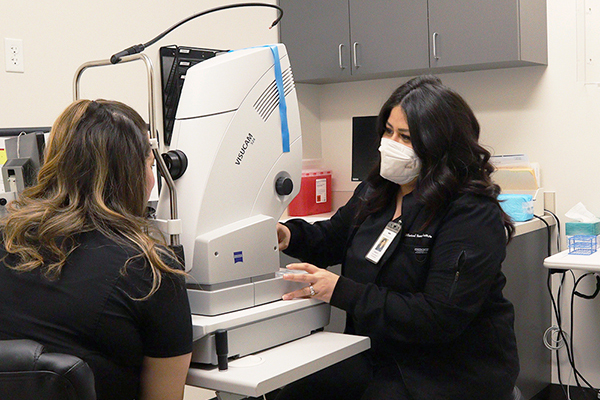The Clinical Trial Process
What to Expect in Your Clinical Trial
All clinical research trials are different, but generally you can expect a high-level, concierge service during your experience. Depending on the clinical trial, you will most likely have several visits throughout the period of the research study.
Usually, you will have a visual acuity assessment, an assessment of an illnesses or changes in medications since your last study visit, measurement of the eye pressure and dilation of the pupils, and an eye exam by the doctor at all study visits.
Depending upon the study, the investigational medication being studied may be an injection into the eye, a medication that is given orally, or a medication that is given in the form of an eye drop. This varies widely by study, so be sure to ask your Research Coordinator or doctor if you have any questions.
All patients participating in clinical trials can further expect to have a dedicated, passionate team of medical professionals caring for your vision.
Clinical Trials Information
Research Coordinators
Your experience during a clinical trial is important to us and the is vital for the success of the research. RCA employs full-time Research Coordinators. This person will be your “Research Concierge” through the clinical trial process. Each trial is assigned one coordinator who works very closely with you throughout the trial and is present at every study visit.
What is the CRC?
The Clinical Research Coordinator is your “point person” for the trial and is there to help answer questions and guide you through the study visits. We know that being part of a clinical trial is often a new experience and we want to make sure that you are confident every step of the way.
What do they do?
First, your doctor may identify you as a potentially suitable candidate for a study. He or she will then refer you to the Research Department within RCA so that you can get more information about the trial. A Research Coordinator will contact you to discuss the trial, and give you written information about the trial for your review. This information is the “Informed Consent Form”: a document that details the purpose of the trial, what the investigational medication is, and what the study assessments are, as well as other information. This document is given to potential trial patients so that you can make an informed decision about whether to participate in a study. Aside from that, they will be your point of contact for any questions that arise throughout the trial.
Why does it matter?
At the Retinal Research Institute, we hope for our trials to be able to provide clear results and data. We believe that having an organized and thoughtful approach to working with our participants is an important factor in obtaining the best results for a trial. We think that the Research Coordinator is a fundamental role for patients to feel they are heard and taken care of throughout the trial process.
Hear what patients are saying
Questions?
If you have questions about the Clinical Trials Process or how to get involved with the Retinal Research Institute, give us a call!


